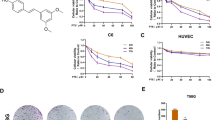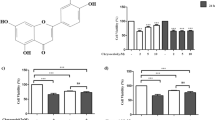Abstract
Resveratrol (Res) has been reported to inhibit tumor initiation, promotion, and progression in a variety of cell culture systems depending on the specific cell type and cellular environment. In the present study, we determined the effect of Res on the cell growth and apoptosis of rat glioma C6 cell line as well as mouse fibroblast 3T3 cell line, in vitro. Concurrently, we investigated whether caspase-3 is involved in the Res-induced apoptosis of rat glioma cells. Exposure to Res exhibits a significant anti-proliferative effect and induces an increase in the population of apoptotic cells on C6 cells in a concentration- and time-dependent manner, but not for normal 3T3 fibroblast cells, as measured by methyl thiazolyl tetrazolium assay and flow cytometer. Distinguished increase of C6 cells in S phase is observed after the treatment of Res as compared to insignificant change in cell cycle distribution of 3T3 cells. TdT-mediated dUTP nick end labeling fluorescence staining, HE staining, and scanning electron microscope revealed abnormal morphology and ultrastructure in C6 cells treated with Res. Our data showed that Res can increase the expression and induced the activation of caspase-3 in rat glioma C6 cells. These results suggest that Res has significant apoptosis-inducing effect on C6 glioma cells other than normal fibroblast 3T3 cells in vitro and caspase-3 may act as a potential mediator in the process.







Similar content being viewed by others
References
Van den Bent MJ, Hegi ME, Stupp R (2006) Recent developments in the use of chemotherapy in brain tumours. Eur J Cancer 42:582–588
Jang M, Cai L, Udeani GO, Slowing KV, Thomas CF, Beecher CW, Fong HH, Farnsworth NR, Kinghorn AD, Mehta RG, Moon RC, Pezzuto JM (1997) Cancer chemopreventive activity of resveratrol, a natural product derived from grapes. Science 275:218–220
Elattar TM, Virji AS (1999) The effect of red wine and its components on growth and proliferation of human oral squamous carcinoma cells. Anticancer Res 19:5407–5414
Hsieh TC, Wu JM (1999) Differential effects on growth, cell cycle arrest and induction of apoptosis by resveratrol in human prostate cancer cell lines. Exp Cell Res 249:109–115
Surh YJ, Hurh YJ, Kang JY, Lee E, Kong G, Lee SJ (1999) Resveratrol, an antioxidant present in red wine, induces apoptosis in human promyelocytic leukemia (HL-60) cells. Cancer Lett 140:1–10
Schneider Y, Vincent F, Duranton B, Badolo L, Gossé F, Bergmann C, Seiler N, Faul F (2000) Anti-proliferative effect of resveratrol, a natural component of grapes and wine, on human colonic cancer cells. Cancer Lett 158:85–91
Lu J, Ho CT, Ghai G, Chen KY (2001) Resveratrol analog, 3,4,5,4′-tetrahydroxystilbene, differentially induces pro-apoptotic p53/Bax gene expression and inhibits the growth of transformed cells but not their normal counterparts. Carcinogenesis 22:321–328
Clement MV, Hirpara JL, Chawdhury SH, Pervaiz S (1998) Chemopreventive agent resveratrol, a natural product derived from grapes, triggers CD95 signaling-dependent apoptosis in human tumor cells. Blood 92:996–1002
Huang C, Ma WY, Goranson A, Dong Z (1999) Resveratrol suppresses cell transformation and induces apoptosis through a p53-dependent pathway. Carcinogenesis (Lond) 20:237–242
Boissy P, Andersen TL, Abdallah BM, Kassem M, Plesner T, Delaisse JM (2005) Resveratrol inhibits myeloma cell growth, prevents osteoclast formation, and promotes osteoblast differentiation. Cancer Res 65:9943–9952
Chow AW, Murillo G, Yu C, van Breemen RB, Boddie AW, Pezzuto JM, Das Gupta TK, Mehta RG (2005) Resveratrol inhibits rhabdomyosarcoma cell proliferation. Eur J Cancer Prev 14:351–356
Gagliano N, Moscheni C, Torri C, Magnani I, Bertelli AA, Gioia M (2005) Effect of resveratrol on matrix metalloproteinase-2 (MMP-2) and secreted protein acidic and rich in cysteine (SPARC) on human cultured glioblastoma cells. Biomed Pharmacother 59:359–364
Wolter F, Akoglu B, Clausnitzer A, Stein J (2001) Downregulation of the cyclin D1/Cdk4 complex occurs during resveratrol-induced cell cycle arrest in colon cancer cell lines. J Nutr 131:2197–2203
Mahyar-Roemer M, Roemer K (2001) p21Waf1/Cip1 can protect human colon carcinoma cells against p53-dependent and p53-independent apoptosis induced by natural chemopreventive and therapeutic agents. Oncogene 20:3387–3398
Tinhofer I, Bernhard D, Senfter M, Anether G, Loeffler M, Kroemer G, Kofler R, Csordas A, Greil R (2001) Resveratrol: a tumor-suppressive compound from grapes, induces apoptosis via a novel mitochondrial pathway controlled by Bcl-2. FASEB J 15:1613–1615
Jiang H, Zhang L, Kuo J, Kuo K, Gautam SC, Groc L, Rodriguez AI, Koubi D, Hunter TJ, Corcoran GB, Seidman MD, Levine RA (2005) Resveratrol-induced apoptotic death in human U251 glioma cells. Mol Cancer Ther 4:554–561
Gajate C, Santos-Beneit AM, Macho A, Lazaro M, Hernandez-De Rojas A, Modolell M, Munoz E, Mollinedo F (2000) Involvement of mitochondria and caspase-3 in ET-18-OCH3 induced apoptosis of human leukemia cells. Int J Cancer 86:208–218
Dercks W, Creasy LL (1989) The significance of stilbene phytoalexins in the Plasmopara viticola–grapevine interaction. Physiol Mol Plant Pathol 34:189–202
Chen Y, Tseng SH, Lai HS, Chen WJ (2004) Resveratrol-induced cellular apoptosis and cell cycle arrest in neuroblastoma cells and antitumor effects on neuroblastoma in mice. Surgery 136:57–66
Ahmad N, Adhami VM, Afaq F, Feyes DK, Mukhtar H (2001) Resveratrol causes WAF-1/p21-mediated G(1)-phase arrest of cell cycle and induction of apoptosis in human epidermoid carcinoma A431 cells. Clin Cancer Res 7:1466–1473
Kuo PL, Chiang LC, Lin CC (2002) Resveratrol-induced apoptosis is mediated by p53-dependent pathway in Hep G2 cells. Life Sci 72:23–34
Joe AK, Liu H, Suzui M, Vural ME, Xiao D, Weinstein IB (2002) Resveratrol induces growth inhibition, S-phase arrest, apoptosis, and changes in biomarker expression in several human cancer cell lines. Clin Cancer Res 8:893–903
Ragione FD, Cucciolla V, Borriello A, Pietra VD, Racioppi L, Soldati G, Manna C, Galletti P, Zappia V (1998) Resveratrol arrests the cell division cycle at S/G2 phase transition. Biochem Biophys Res Commun 250:53–58
Park JW, Choi YJ, Jang MA, Lee YS, Jun DY, Suh SI, Baek WK, Suh MH, Jin IN, Kwon TK (2001) Chemopreventive agent resveratrol, a natural product derived from grapes, reversibly inhibits progression through S and G2 phases of the cell cycle in U937 cells. Cancer Lett 163:43–49
Castello L, Tessitore L (2005) Resveratrol inhibits cell cycle progression in U937 cells. Oncol Rep 13:133–137
Kim YA, Choi BT, Lee YT, Park DI, Rhee SH, Park KY, Choi YH (2004) Resveratrol inhibits cell proliferation and induces apoptosis of human breast carcinoma MCF-7 cells. Oncol Rep 11:441–446
Larrosa M, Tomas-Barberan FA, Espin JC (2003) Grape polyphenol resveratrol and the related molecule 4-hydroxystilbene induce growth inhibition, apoptosis, S-phase arrest, and upregulation of cyclins A, E, and B1 in human SK-Mel-28 melanoma cells. J Agric Food Chem 51:4576–4584
Rigolio R, Miloso M, Nicolini G, Villa D, Scuteri A, Simone M, Tredici G (2005) Resveratrol interference with the cell cycle protects human neuroblastoma SH-SY5Y cell from paclitaxel-induced apoptosis. Neurochem Int 46:205–211
Fulda S, Debatin KM (2004) Sensitization for tumor necrosis factor-related apoptosis-inducing ligand-induced apoptosis by the chemopreventive agent resveratrol. Cancer Res 64:337–346
Wang Q, Li H, Wang XW, Wu DC, Chen XY, Liu J (2003) Resveratrol promotes differentiation and induces Fas-independent apoptosis of human medulloblastoma cells. Neurosci Lett 351:83–86
Brakenhielm E, Cao R, Cao Y (2001) Suppression of angiogenesis, tumor growth, and wound healing by resveratrol, a natural compound in red wine and grapes. FASEB J 15:1798–1800
Kimura Y, Okuda H (2001) Resveratrol isolated from Polygonum cuspidatum root prevents tumor growth and metastasis to lung and tumor-induced neovascularization in Lewis lung carcinoma-bearing mice. J Nutr 131:1844–1849
Bhat KP, Lantvit D, Christov K, Mehta RG, Moon RC, Pezzuto JM (2001) Estrogenic and antiestrogenic properties of resveratrol in mammary tumor models. Cancer Res 61:7456–7463
Tseng SH, Lin SM, Chen JC, Su YH, Huang HY, Chen CK, Lin PY, Chen Y (2004) Resveratrol suppresses the angiogenesis and tumor growth of gliomas in rats. Clin Cancer Res 10:2190–2202
Acknowledgment
This work was supported by The Natural Science Foundation of China (No. 30370512).
Author information
Authors and Affiliations
Corresponding author
Rights and permissions
About this article
Cite this article
Zhang, W., Fei, Z., Zhen, Hn. et al. Resveratrol inhibits cell growth and induces apoptosis of rat C6 glioma cells. J Neurooncol 81, 231–240 (2007). https://doi.org/10.1007/s11060-006-9226-x
Received:
Accepted:
Published:
Issue Date:
DOI: https://doi.org/10.1007/s11060-006-9226-x




